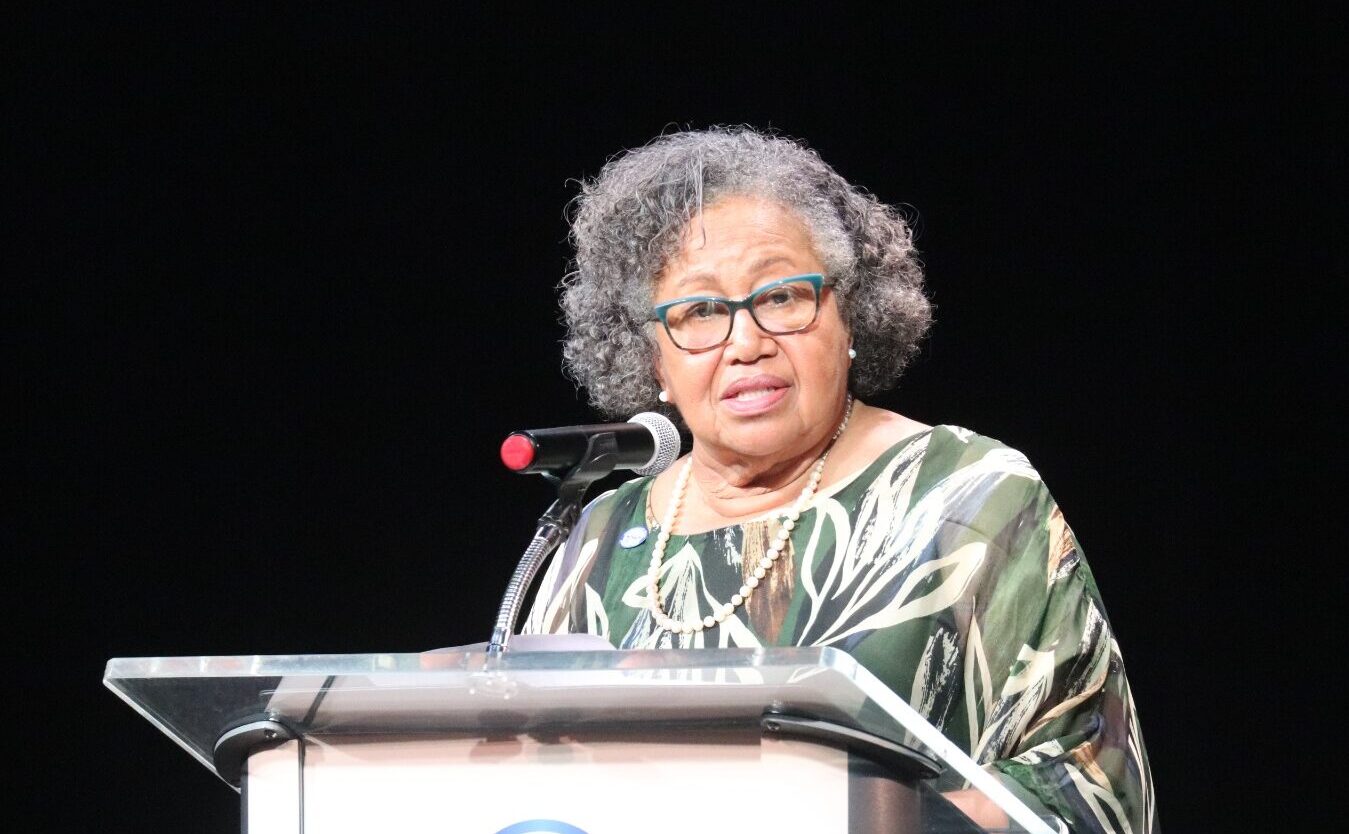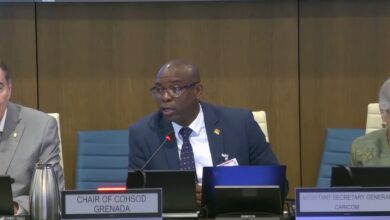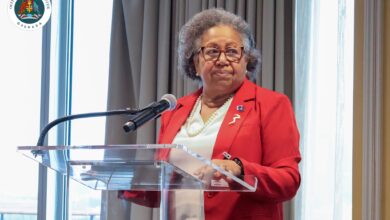“Health has long been a central focus of the regional development agenda in CARICOM. Guided by the Caribbean Cooperation in Health (CCH) framework, now in its fourth iteration, our Governments have collectively identified and continue to address priority health concerns that affect the people of the Caribbean Community. The Caribbean Cooperation in Health framework has provided the platform for aligning strategies, mobilising resources, and advancing joint action on Health across Member States.”
Dr Carla Barnett, CARICOM Secretary-General
CARICOM Secretary-General Dr Carla Barnett has reaffirmed the Caribbean Community’s commitment to advancing health as a cornerstone of sustainable development during her remarks at the Opening Ceremony of the Second Joint Meeting of Ministers of Health of the African and Caribbean Regions, held in Addis Ababa, Ethiopia, today, Saturday, 6 September.
Dr Barnett expressed gratitude to the Government and People of Ethiopia for their warm hospitality, and acknowledged the African Union and the Health Development Partnership and Cooperation (HeDPAC) for their collaboration in convening the meeting.
She highlighted CARICOM’s longstanding focus on health, guided by the Caribbean Cooperation in Health (CCH) framework, which has enabled Member States to align strategies, mobilise resources, and take collective action on priority health issues.
“Health has long been a central focus of the regional development agenda in CARICOM. Guided by the Caribbean Cooperation in Health (CCH) framework, now in its fourth iteration, our Governments have collectively identified and continue to address priority health concerns that affect the people of the Caribbean Community. The Caribbean Cooperation in Health framework has provided the platform for aligning strategies, mobilising resources, and advancing joint action on Health across Member States,” Dr Barnett stated.
She also reflected on CARICOM’s leadership in addressing non-communicable diseases (NCDs), referencing the 2007 Port-of-Spain Declaration that catalysed global attention and led to the United Nations High-Level Meeting on NCDs in 2011. She noted regional initiatives such as Caribbean Wellness Day, fiscal policies targeting unhealthy products, and community-driven campaigns like Caribbean Moves, which promote active lifestyles and healthier environments.
Further, she acknowledged CARICOM’s achievements in maternal and child health, HIV prevention, and emergency response, particularly the role of the Caribbean Public Health Agency (CARPHA) during the COVID-19 pandemic. “These are achievements of which we are proud. They reflect the strength of regional integration and the good outcomes that are possible when the small states are determined to act together for the common good,” she said.
Dr Barnett emphasised that the pandemic exposed critical vulnerabilities, including gaps in health financing, workforce retention, and supply chain security. She expressed appreciation for the African Medical Supplies Platform, which provided essential support during the crisis.
Recognising shared challenges, such as high NCD burdens, infectious disease risks, and limited fiscal space, Dr Barnett called for deeper cooperation between Africa and the Caribbean. She pointed to the Memorandum of Understanding between CARICOM and HeDPAC as a framework for collaboration in areas such as health workforce development, joint procurement, sustainable financing, and primary health care.
“This second joint meeting is a clear signal that Africa and the Caribbean are working more closely together,” she said. “We are bound by history, and we share a vision for the future. Our responsibility is not only to exchange ideas, but to agree on concrete actions that can be pursued collectively by our governments and supported by our Regional Institutions and partners.”
Please read her complete speech below:
Salutations
On behalf of the Caribbean Community (CARICOM), I thank the Government and People of Ethiopia for their warm welcome and hospitality. I also wish to acknowledge the African Union and the Health Development Partnership and Cooperation (HeDPAC) and thank them for their collaboration with CARICOM in convening this Second Joint Meeting of Ministers of Health of the African and Caribbean Regions.
This Meeting presents us with the opportunity to reflect on how we can accelerate our working together to advance health as a pillar of sustainable social and economic development.
Health has long been a central focus of the regional development agenda in CARICOM. Guided by the Caribbean Cooperation in Health (CCH) framework, now in its fourth iteration, our Governments have collectively identified and continue to address priority health concerns that affect the people of the Caribbean Community. The Caribbean Cooperation in Health framework has provided the platform for aligning strategies, mobilising resources, and advancing joint action on Health across Member States.
In 2007, CARICOM Heads of Government adopted the Port-of-Spain Declaration on Non-Communicable Diseases (NCDs) and brought non-communicable diseases to the attention of the world, becoming a catalyst for the United Nations High-Level Meeting on NCDs in 2011. Following the Port-of-Spain Declaration, CARICOM Heads of Government mandated the annual observation of Caribbean Wellness Day, to engage communities in promoting healthy living. Member States have also pursued fiscal measures such as taxes on sugar-sweetened beverages, alongside policy efforts to create healthier food environments. Complementing these approaches, initiatives such as Caribbean Moves are empowering our people to incorporate more physical activity and wellness into their daily lives. These efforts demonstrate some of the ways in which CARICOM has worked through multisectoral action, and our shared vision to reduce the burden of NCDs and promote improved health and wellness of the people of the Caribbean Community.
CARICOM has made notable advancements in maternal and child health through effective immunisation programs. Additionally, the Community has maintained a strong regional focus on HIV prevention, care, and treatment. The work of a critical CARICOM Institution, the Caribbean Public Health Agency (CARPHA), has further strengthened our surveillance, laboratory capabilities, and emergency response efforts. During the COVID-19 pandemic, CARPHA played an important role in coordinating testing and facilitating information sharing across the Community. These are achievements of which we are proud. They reflect the strength of regional integration and the good outcomes that are possible when the small states are determined to act together for the common good.
The COVID-19 pandemic demonstrated the resilience and solidarity of our Community, as we worked collectively to protect our populations. At the same time, the pandemic revealed major vulnerabilities. Gaps in health financing, the retention of our health workforce, and the security of supply chains that are critical to ensuring uninterrupted access to medicines, vaccines, and essential equipment were brought to the fore. Indeed, we are eternally grateful for the assistance we received from the African Medical Supplies Platform, which allowed us to access critical medical supplies that were not otherwise easily available.
Our two Regions share a high burden of NCDs, ongoing risks from infectious diseases, limited fiscal space, and a need to build stronger, more resilient health systems. These common challenges also create space for cooperation and solidarity. It is in this spirit that we view this second joint meeting as an opportunity to deepen cooperation between Africa and the Caribbean on concrete priorities, such as health workforce development, joint procurement, sustainable financing, and collaborative research.
The Memorandum of Understanding signed between CARICOM and HeDPAC provides a framework for such cooperation. It outlines practical areas where our Regions can collaborate more closely, particularly in strengthening primary health care and advancing universal health coverage.
Excellencies, colleagues, this Second Joint Meeting is a clear signal that Africa and the Caribbean are working more closely together. We are bound by history, and we share a vision for the future. Our responsibility is not only to exchange ideas, but to agree on concrete actions that can be pursued collectively by our governments and supported by our Regional Institutions and partners.
CARICOM looks forward to the outcomes of this Meeting, and to building on our partnership with the African Union and with HeDPAC. Together, we can accelerate the progress we are making, address the challenges we face, and move closer to our shared goal of achieving universal health coverage and sustainable development for the peoples of our Regions.
Thank you.






